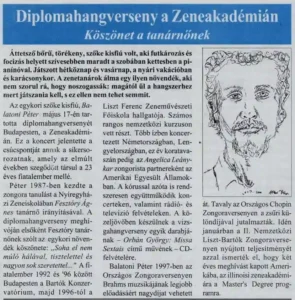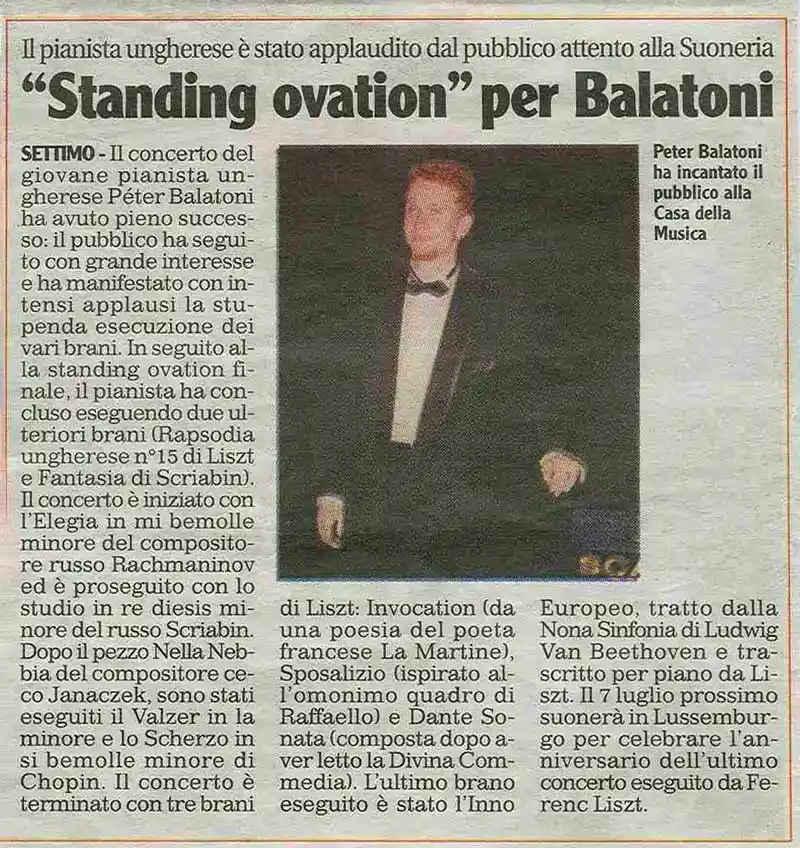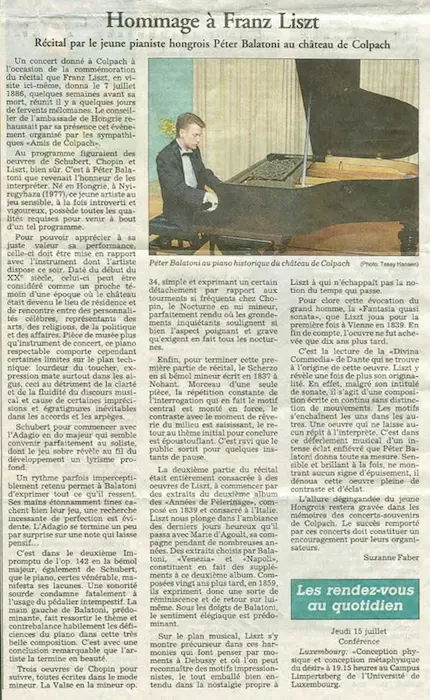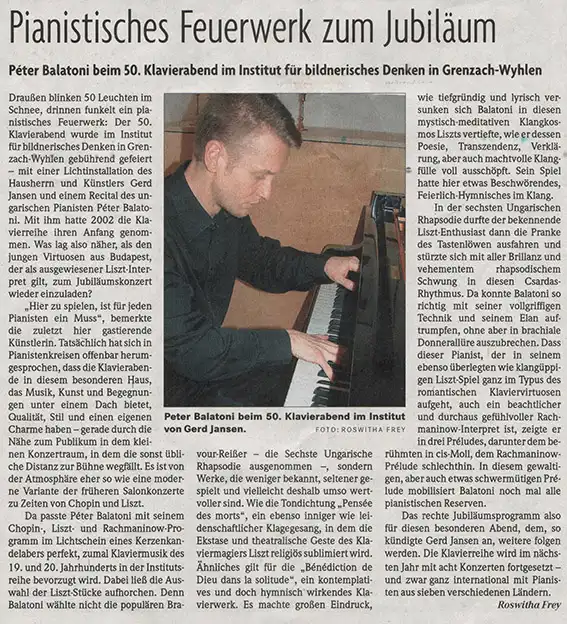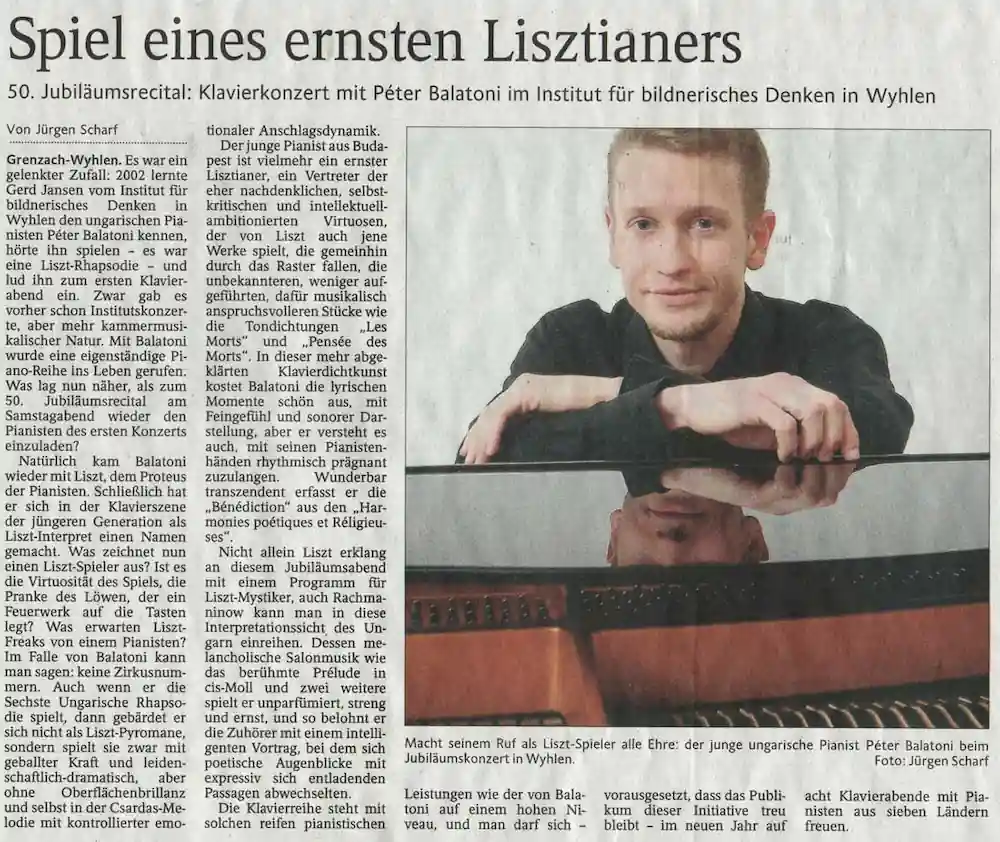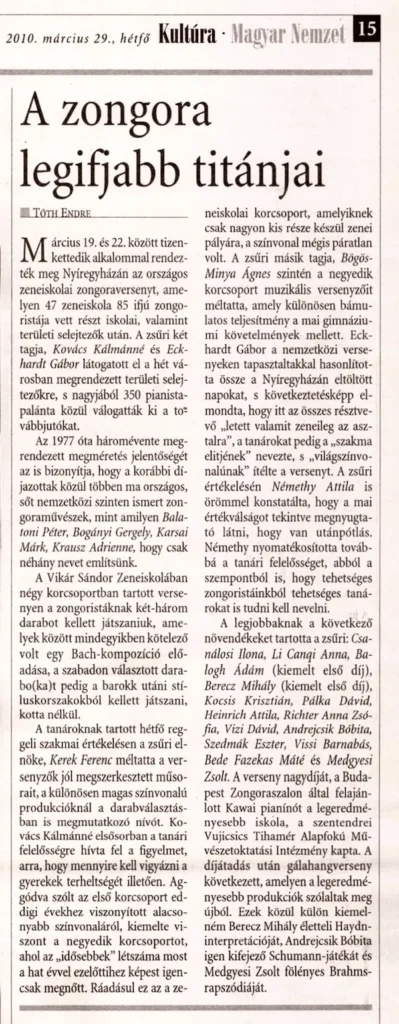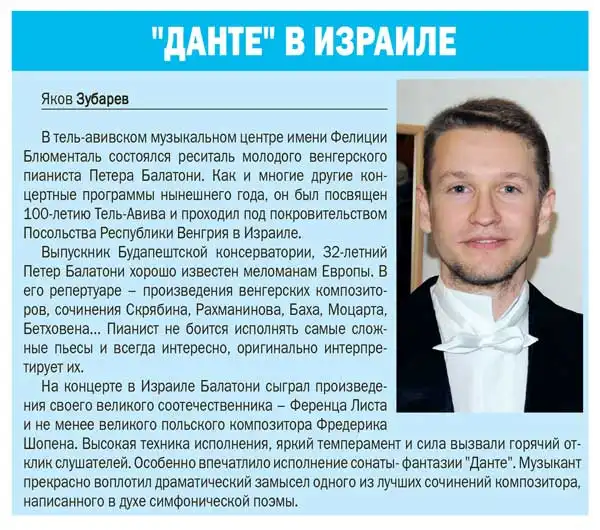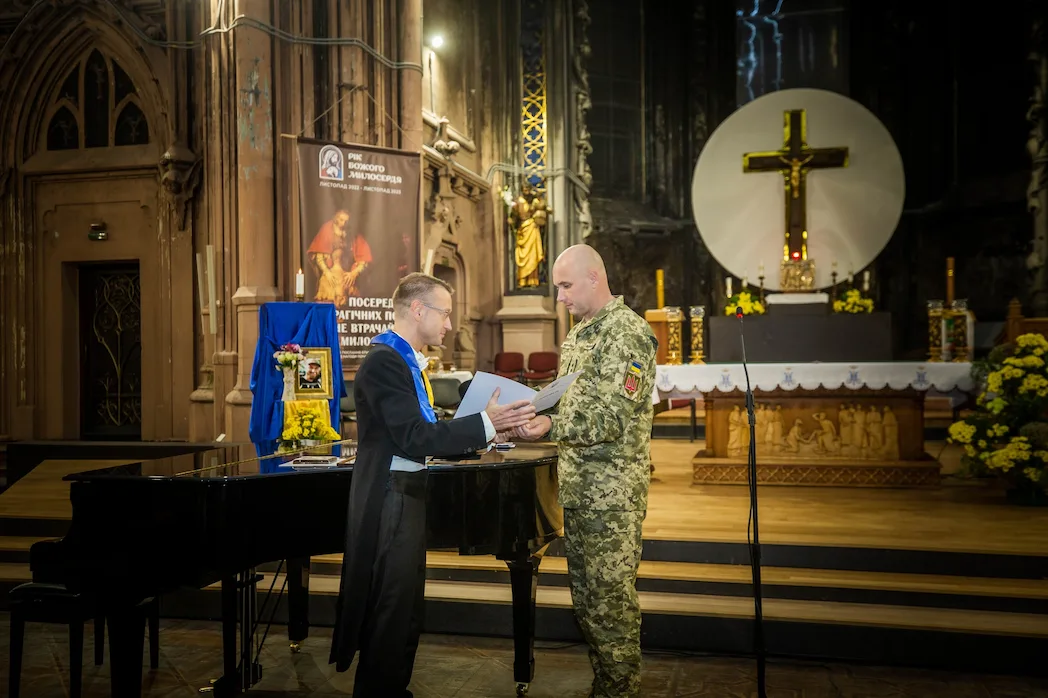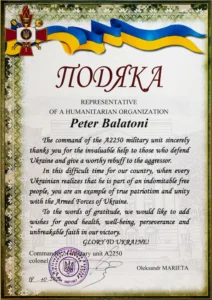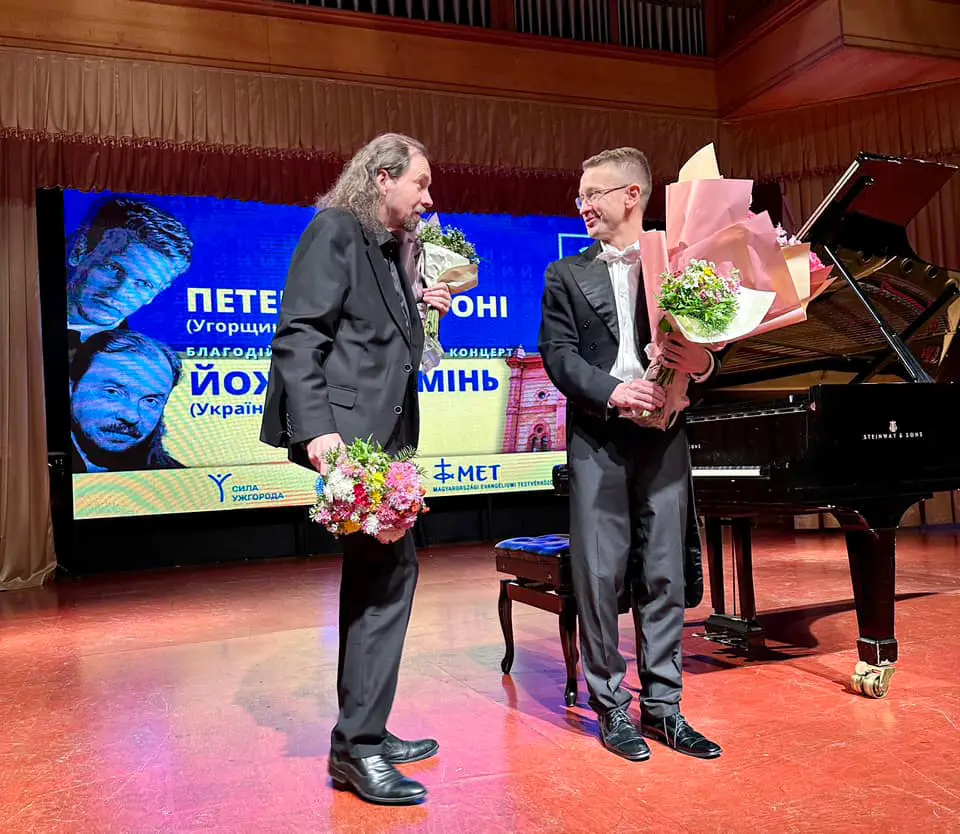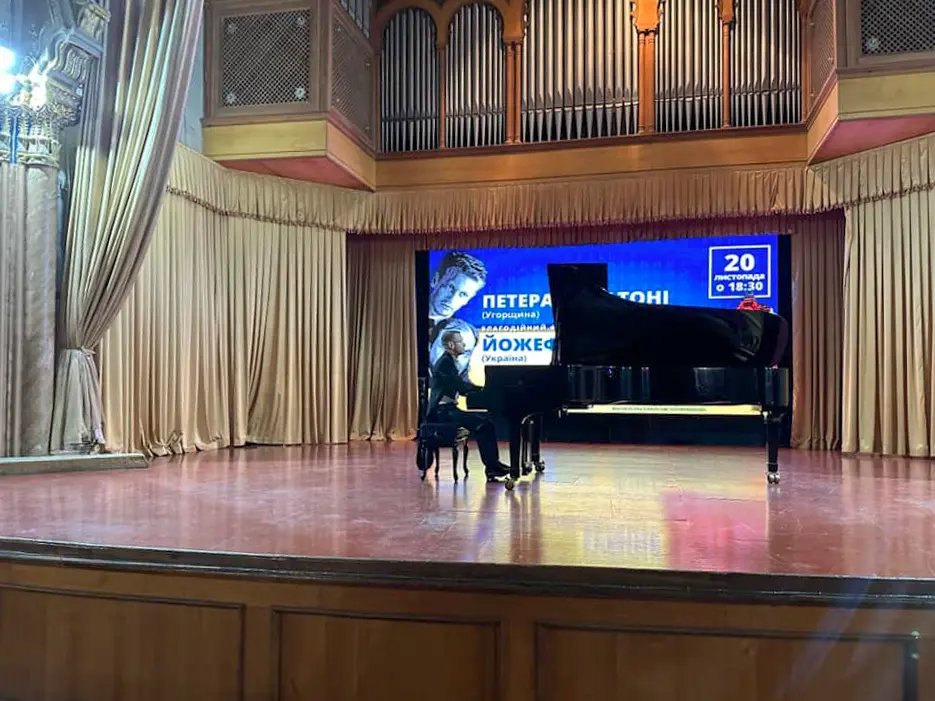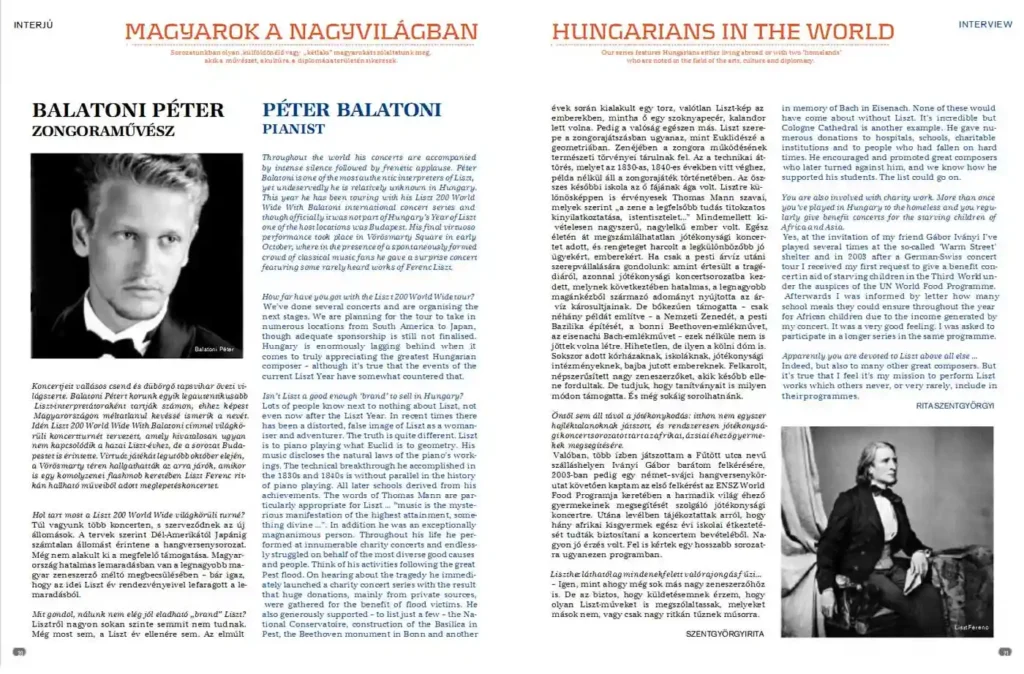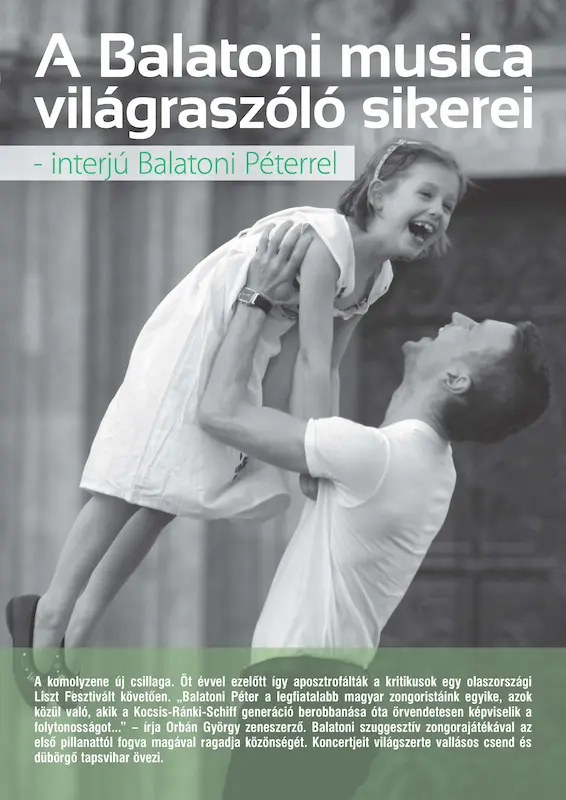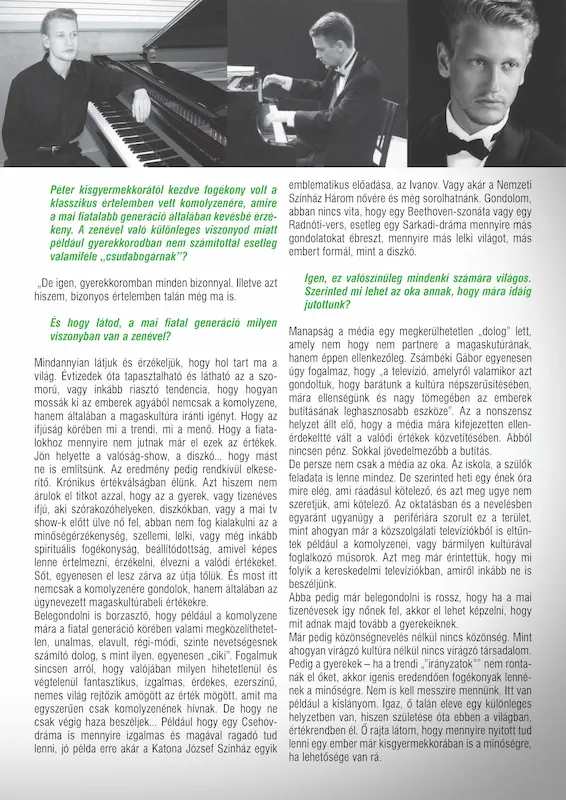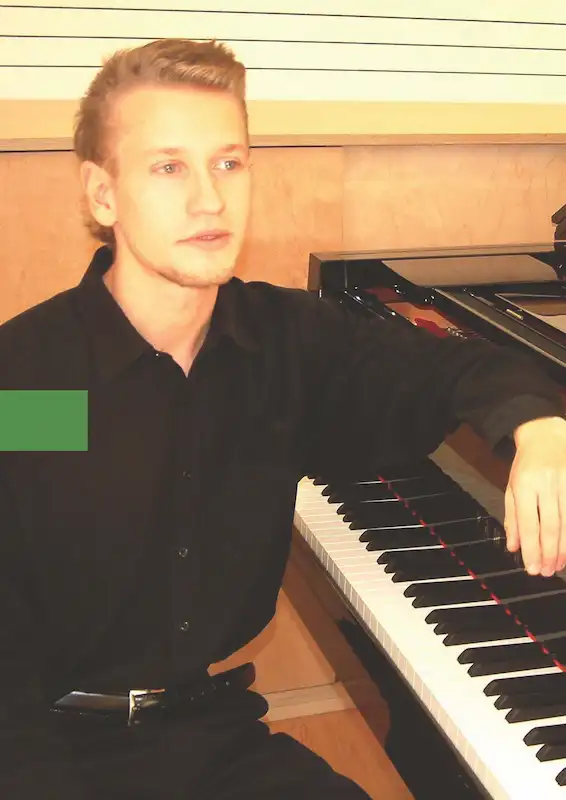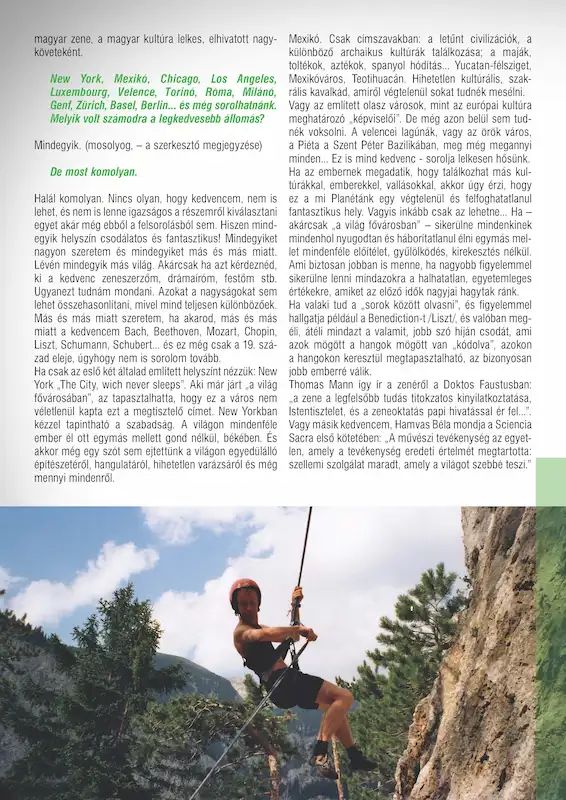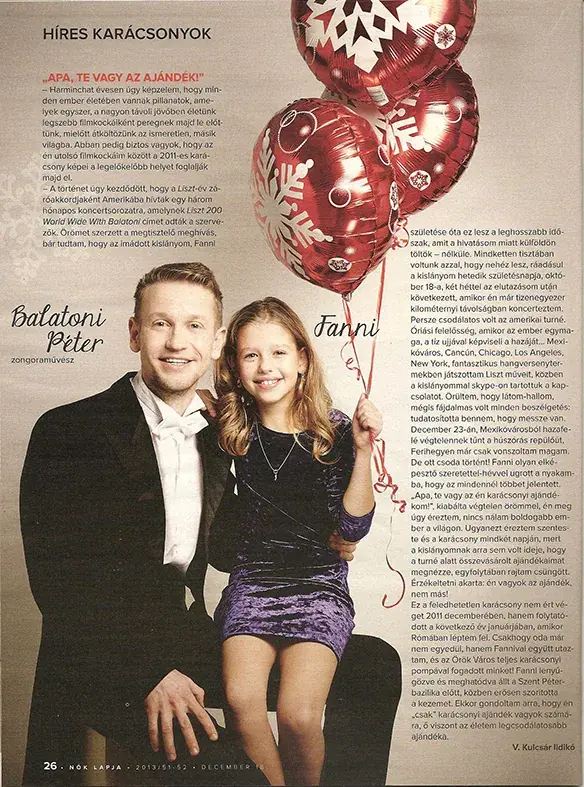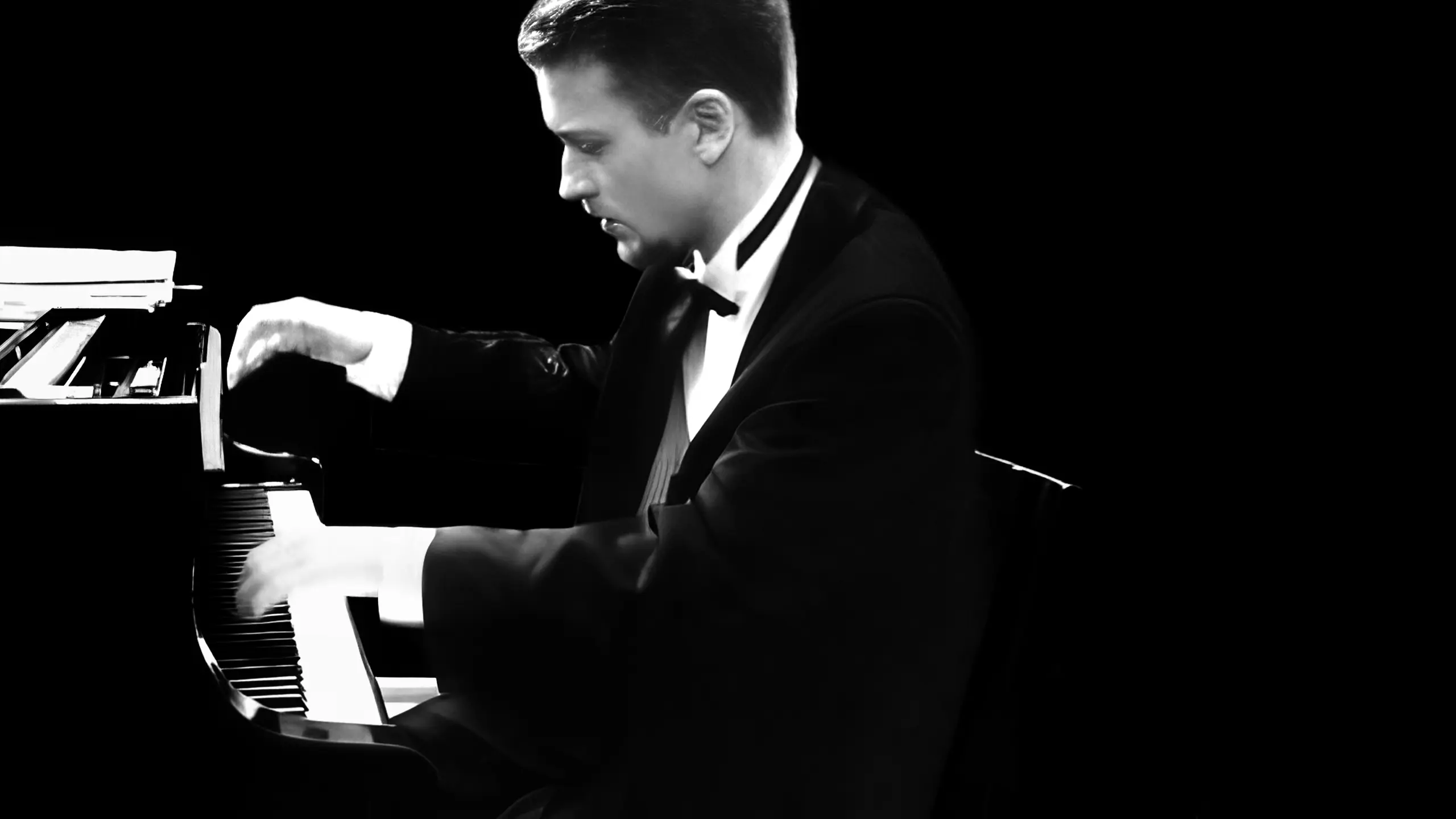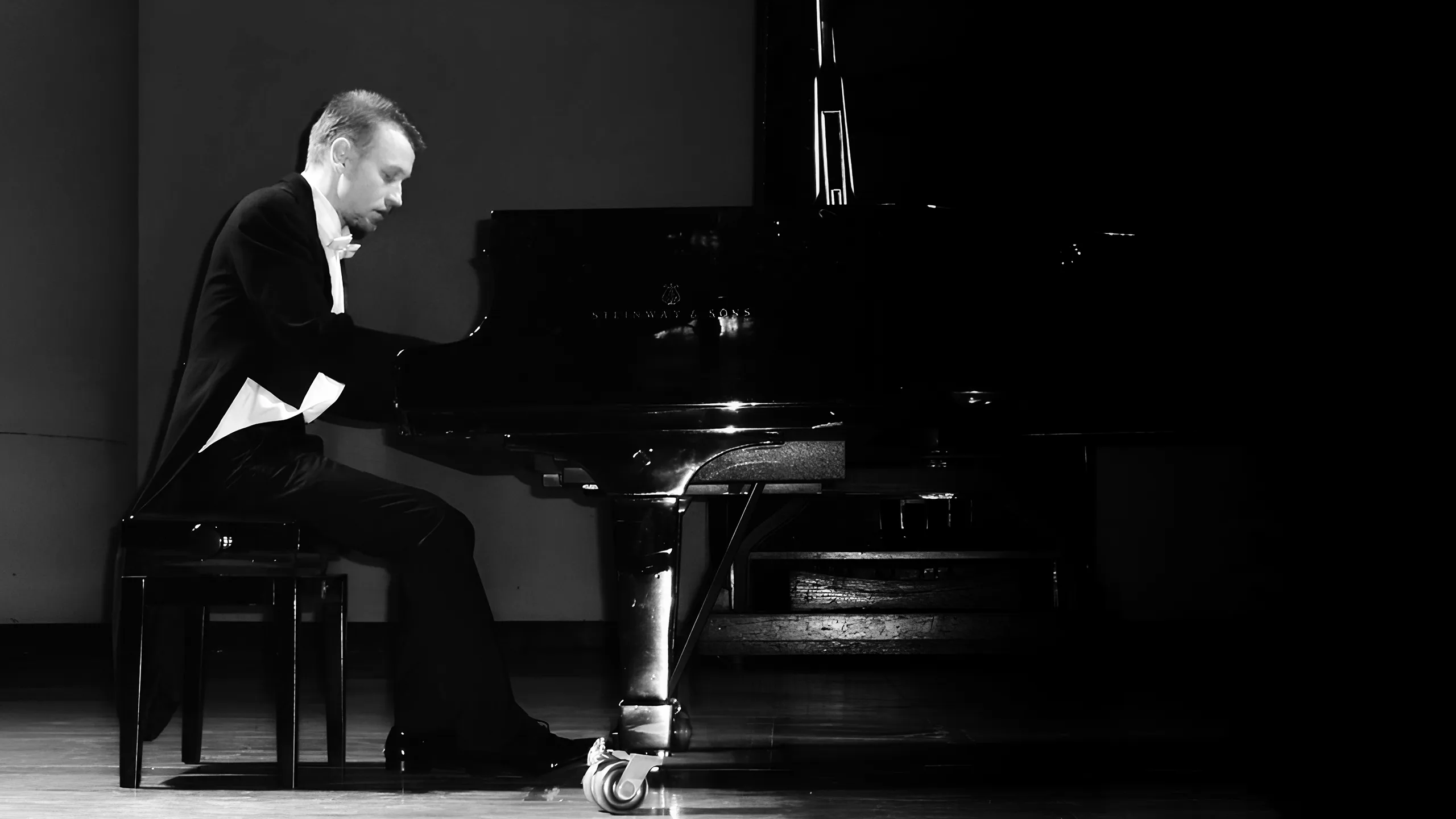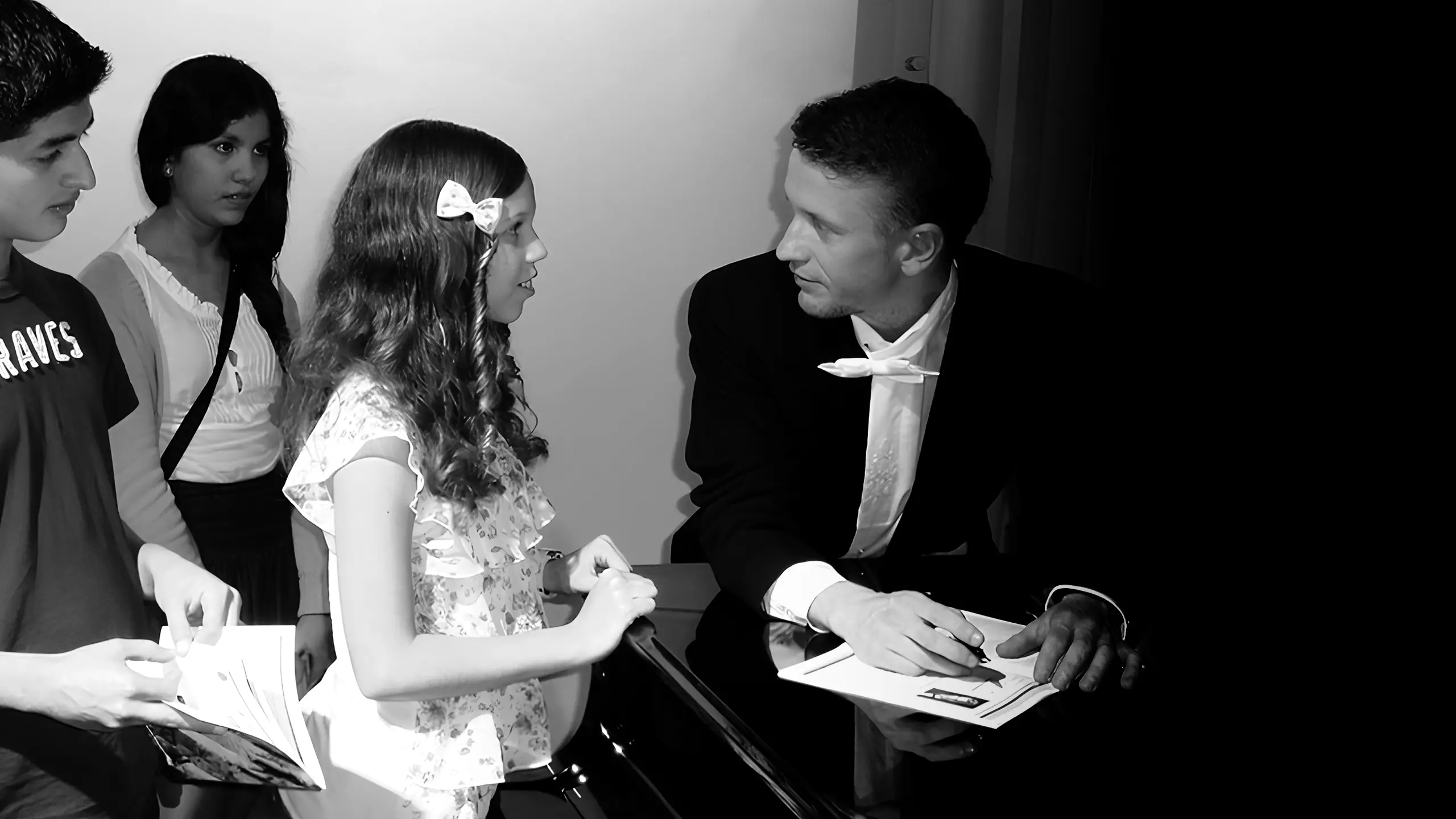Critiques

Diploma competition at the Liszt Academy
Thanks to the teacher
Nyíregyházi Napló | 25 May, 2000.
He was a fair, fragile, blond boy who preferred solitude with the piano over running around and playing football. He played tirelessly on weekdays, Sundays, during summer holidays, and at Christmas. A music teacher’s dream is a self-motivated student who willingly sits at the instrument, driven by their passion for playing.
Péter Balatoni, the former fair-haired boy, presented his graduation recital on 17 May at the Music Academy in Budapest. This concert marked the culmination of his recent series of achievements at the age of 23.
Péter began studying piano in 1987 at the Nyíregyháza Music School under the guidance of Ágnes Fesztóry. In his invitation to the graduation concert, he expressed his gratitude to teacher Fesztóry. The young man studied at the Bartók Conservatoire in Budapest from 1992 to ’96, and then at the Liszt Academy of Music from 1996. He has participated in several prestigious international courses. He has performed numerous concerts in Germany and Poland, and earlier this year in the United States of America, collaborating as a pianist with the Angelica Choir. Since then, he has established an ongoing collaboration with the choir, participating in concerts and making contributions to radio and television recordings. A CD recording of one of the competition pieces, György Orbán’s Missa Sextais, is currently in preparation.
In 1997, Péter Balatoni was awarded the Grand Prix at the National Piano Competition for his exceptional performance of Brahms’ music. Last year, he received the Special Jury Prize at the National Chopin Piano Competition. In January of this year, his performance at the II International Liszt-Bartók Piano Competition earned him a two-year invitation to the Illinois Academy of Music in America for a Master’s Degree program.

Virtuosity paired with expressive power
Peter Balatoni’s piano recital
Roswitha Frey | Badische Zeitung | 24 September, 2003.
Rheinfelden – The young Hungarian pianist Peter Balatoni selected difficult virtuoso works for his piano concert at Schloss Beuggen. The four Ballads from Chopin, not to mention Scriabin and Liszt are all works which require large expressive capacity as well as technical prowess. Balatoni, who received his training at the Bartok Conservatory and the Liszt Academy of Music in Budapest and is only 26, is endowed with both.
Virtuosity and a youthful disposition serve this exceptional piano prodigy neither as ends in themselves nor as means of superficial or dazzling show, but are continuously bound together in a piano play completely immersed in the music.
The power and poetry with which he masters his difficult programme is all the more amazing considering that until recently Balatoni had no instrument of his own at his disposal for practicing and had to learn the pieces amidst such difficult conditions. Despite these circumstances an exceptional piano talent has emerged, a young man “who plays as if his life depended on it”. So does Gerd Jansen of the Institute for the Arts in Grenzach-Wyhlen refer to him, who together with the piano master-builder Thomas Strecker have stepped up as patrons of this young pianist and have given him the possibility to perform in front of the audience in Beuggen.
Already Balatoni’s Chopin-playing on the historic Erard piano is impressive. He unfolds the entire lyrical and epical force of these ballads, listens with empathy to the lyrical musings of these piano poems and also possesses the necessary virtuosic skill for the dramatic emotions. He builds up and then releases tension with consistent elegancy. He fully captures the atmosphere of the fourth ballad, which the great Alfred Cortot once deemed “the first sign of Impressionism”. Balatoni is also at ease with the explosive virtuosic style of Alexander Skriabin’s Fantasy in h-minor op. 28, and brings out the inner drama and agitation of this piece with fascinating power and intensity.
Peter Balatoni closed his exceptional recital with two works by Liszt. The religious emotions and solemnity of Liszt’s “Invocation” are moulded in his hands as movingly as the “Dante Sonata”, Liszt’s greatest composition from Annees the Pelerinage. The young pianist captures the entire range of the Dante Sonata impressively, savours the lyrical moments of the love song, elaborates the melodic arches beautifully, and unleashes passionate drama in the outbursts and somber visions of damnation and hell. The power and turbulence, magic and suggestivity of Liszt’s music spread in Balatoni’s playing on the enthralled audience, who applauded the young virtuoso long and loud.
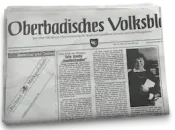
Brilliant playing and expressive gestures
Péter Balatoni gives a guest performance at the „Institut für bildnerisches Denken”
Gerd Jansen | Oberbadisches Volksblatt | 30 October, 2003.
Grenzach-Wyhlen – The concert tour of the young, outstanding pianist Péter Balatoni came to an end with a concert at the “Institut für bildnerisches Denken”. The seven-concert tour took him to different parts of the region and Switzerland.
Péter Balatoni had already been playing several concerts at the Art Institute in Grenzach-Wyhlen for a year, so there was a good basis in the public for this concert series. Gerd Jansen, who also coordinated these concerts, has a successful record for this special pianist. An average of 100 visitors per concert is a remarkable result and it clearly speaks for the fascinating charisma of this young, still relatively unknown piano talent.
His virtuoso program with works by Frédéric Chopin, Franz Liszt and Alexander Scriabin kept the audience in suspense from beginning to end in the last concert as well. One would almost like to say a too powerful program with the Four Ballads by Chopin, the Fantasy by Scriabin and the Invocation and Dante Fantasy by Liszt. Thus it was not easy for the audience and for the pianist to hold out, but precisely because of this a tension was built up that gradually demanded more movement and, as it were, in the small passages of calming soon longed for dizzying virtuosity again. Thus the choice of the Dante Fantasy as the closing piece was quite understandable, uniting all that had been heard before in the scenes of heaven and hell.
Péter Balatoni is a pianist with extraordinary power and the finest sensitivity. He convinced not only with brilliant playing, but also with expressive gestures. He offered not only an experience for the ears, but it was also a pleasure to watch him. He was able to break down the deepest dimensions of the musical pieces and convey them with a wonderful directness.
The overall impression was fresh and overwhelming and, above all, never academic. Balatoni preferred to follow a risky way of playing rather than a safe lack of expression As a piano talent, he is a bizarre personality who strictly rejects any kind of competition and is open to the most diverse ways of interpretation, and whose main concern is to advocate for people and music.
Thus, the enthusiastic final applause in the „Institut für bildnerisches Denken” after the Hungarian Rhapsody No.15 as an encore was not only for the virtuoso, but also for the human being Peter Balatoni. It is also no coincidence that he subsequently played a benefit concert for needy children in Turin, which was organized by the United Nations and the TNT Foundation.
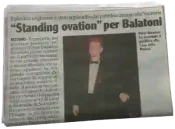
Standing ovation for Balatoni
The Hungarian pianist was acclaimed by the attentive audience in the concert hall
la Nuova Metropoli | 20 May, 2004
Settimo – Settimo – The concert of the young Hungarian pianist Péter Balatoni was a resounding success: the audience followed with great interest and expressed their appreciation through enthusiastic applause for the magnificent performance of the various pieces.
After the final standing ovation, the pianist concluded the concert with two additional compositions: Liszt’s Hungarian Rhapsody No. 15 and Scriabin’s Fantasia. The concert commenced with Rachmaninov’s Elegy in E-flat minor, a composition by the Russian composer, followed by Scriabin’s Etude in D-sharp minor. Czech composer Janaczek’s In the Fog was performed, followed by Chopin’s Waltz in A minor and Scherzo in B-flat minor. Liszt’s compositions took the spotlight towards the end, with Invocation (inspired by a poem by French poet La Martine), Sposalizio (inspired by Raphael’s painting of the same name), and Dante Sonata (composed after reading the Divine Comedy by Dante). The final piece performed was the European Anthem, derived from Ludwig Van Beethoven’s Ninth Symphony and transcribed for piano by Liszt. On July 7th, Péter Balatoni will showcase his talent in Luxembourg, commemorating the anniversary of Ferenc Liszt’s last concert.
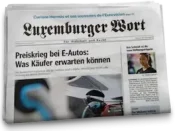
Tribute to Franz Liszt
Recital by the young Hungarian pianist Péter Balatoni at Château de Colpach
Suzanne Faber | Luxemburger Wort | 15 July, 2004.
A concert was held in Colpach to commemorate the recital that Franz Liszt, during his visit here, gave on July 7, 1896, just a few weeks before his death. It gathered fervent music lovers a few days ago. The presence of the Hungarian embassy’s counselor elevated this event organized by the sympathetic “Friends of Colpach.”
The program included works by Schubert, Chopin, and, of course, Liszt. It was Péter Balatoni who had the honor of interpreting them. Born in Hungary, in Nyíregyháza (1977), this young artist, with his sensitive and at the same time vigorous playing, possesses all the qualities required to tackle such a program.
To fully appreciate the value of his performance, it must be compared to the instrument available to the artist tonight. Dating from the early 20th century, it can be considered a close witness to a time when the château became a place of residence and meeting for famous personalities, representatives of the arts, religion, politics, and business. More of a museum piece than a concert instrument, this respectable piano, despite its technical limitations such as a heavy touch and a somewhat dull expression, especially in the treble, compromising clarity and fluidity in the musical discourse and leading to some inevitable inaccuracies and scratches in chords and arpeggios.
Schubert’s Adagio in C major was chosen to start, which seems perfectly suited to the soloist, whose restrained playing reveals profound lyricism as it unfolds.
A sometimes imperceptibly restrained rhythm allows Balatoni to express everything he feels. His surprisingly delicate hands conceal their game well, and a constant quest for perfection is evident. The Adagio ends somewhat surprisingly on a note that leaves one pensive…
It was in the second Impromptu of Op. 142 in A-flat major, also by Schubert, that the piano, though venerable, revealed its limitations. A muffled sound inevitably leads to the use of the pedal inopportunely. Balatoni’s dominant left hand brings out the theme and skillfully compensates for the deficiencies of the piano in this beautiful composition. The artist concludes it remarkably.
Three works by Chopin followed, all written in the minor mode. The Waltz in A minor, Op. 34, simple and expressing a certain detachment from the torments so frequent in Chopin’s works, the Nocturne in E minor, perfectly rendered, where the ominous rumblings underline the poignant and grave aspect required by all nocturnes.
Finally, to conclude this first part of the recital, the Scherzo in B-flat minor, written in 1837 at Nohant. A single-piece composition, the constant repetition of the questioning, which forms the central motif, grows in strength. The contrast with the moment of reverie in the middle is striking, and the return to the initial theme to conclude is breathtaking. The audience left for a short pause, delighted by the performance.
The second part of the recital was entirely dedicated to works by Liszt, starting with excerpts from the second album of the “Years of Pilgrimage,” composed in 1839 and dedicated to Italy. Liszt immerses us in the atmosphere of the last happy days he spent with Marie d’Agoult, his companion for many years. The selected excerpts by Balatoni, “Venezia” and “Napoli,” are actually supplements to this second album. Composed twenty years later, in 1859, they express a kind of reminiscence and introspection. Under Balatoni’s fingers, the elegiac sentiment prevails.
Musically, Liszt demonstrates his pioneering spirit in these harmonies that occasionally evoke Debussy and contain recognizable impressionistic motifs, all wrapped in Liszt’s inherent nostalgia for the passage of time.
To conclude this tribute to the great composer, Liszt’s “Fantasia quasi sonata,” which he first played in Vienna in 1839, was performed. In the end, the piece was not completed until ten years later.
The reading of Dante’s “Divina Commedia” served as the inspiration for this work. Once again, Liszt reveals his originality. Despite its sonata designation, it is a composition written continuously without distinct movements. The motifs intertwine seamlessly. It is a piece that grants no respite to the performer. Péter Balatoni, with his sensitive and brilliant interpretation, displayed his full potential. Showing no signs of exhaustion, he unraveled this contrasting and brilliant work.
Performance by the young Hungarian pianist will remain etched in the memories of Colpach’s commemorative concerts. The success achieved by these performances should serve as an encouragement to their organizers.

Exciting, emotional piano experience
The young Hungarian pianist Péter Balatoni with a piano night at the Institut für bildnerisches Denken
Roswitha Frey | Badische Zeitung | 13 April, 2005.
Mighty virtuoso literature has mastered the young Hungarian pianist Péter Balatoni for his piano night at the Institut für bildnerisches Denken in Grenzach-Wyhlen (South Germany).
Liszt and Rachmaninov – this was almost “calling” after the claw of the key-lion. And then the four Impromptus op.90. of Schubert, which Balatoni laid on the keys with great emphasis and mastering touch. It awakened unrestricted admiration, how brilliantly, with what earnestness and ability of getting into the spirit of the depths of feelings of the romantic epoch the 27-year-old was playing these Schubert-Impromptus. Balatoni has got the technique as well as the ability of expression to catch the moods of these pieces. His playing of Schubert was lyrically expressive and then again filled with energy and powerful.
A young talented virtuoso was sitting there at the grand piano, who charged these pieces with strong emotions and who was increasing them right intoxicatingly. But he also had a fine sense for the rather dreamy pieces, that he was playing sparklingly and with high tone culture. In the Rachmaninov-Prelude in c-sharp minor op. 3. and in the following Liszt-block Balatoni did not succumb to the temptation of just hitting upon some kind of “thunder-allures” and sensationalism. Rather in these parade pieces fascinated the fiery and mighty virtuoso temper of the pianist as well as his effort for profoundness.
The guest from Budapest, who got his formation at the Bartók Conservatory and at the Liszt Academy, could of course serve with great gesture and mighty master sensation for example in the Transcendental Etudes of Liszt Nr. 8 c-minor, in the “Wilde Jagd”. The unloading Etude is as it is, an essence of romantic virtuosity and a technically so well forearmed pianist like Balatoni can in this bold piece with its wild-moved passages very much sparkle. Then again he shows in “Sposalizio” of the “Années de Pélerinage” that he also can design a tone-picturesque mood-picture, a dream-spun-yarn which increases to a magic sound-building. Yes, in this piece Balatoni has out and out caught also the mystical and visionary of Liszt’s music.
And then the “Funérailles”, he is playing in a gloomy, heart-stirring way this piece, that Liszt composed in honour of the Hungarian martyrs, that were executed. Full of pathos, passion and sound-might conjures Péter Balatoni the dark powers of this music, the painful lamentation, the march-theme, the heavy, hard, thrilling moments. Hats off to this pianistic act of power joined with a piano-sound so rich in colour-factor. A great applause of the audience, that was sitting round the pianist in a tight crowd and that was very close there at this exciting piano-experience.
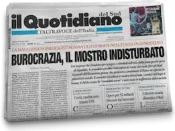
Liszt Festival Opening Night: Balatoni – Virtuoso and Enchanting
Tiziana Capocasa | Il Quotidiano | 26 June, 2008.
Grottammare – The Liszt Festival named after the musician who was a guest of Grottammare in the 19th century is going to be opened by the charming and promising Hungarian pianist. Balatoni, the virtuoso is going to evoke the art of the master at the Santa Lucia Church on Sunday, July 27, at 9:30 pm.
Péter Balatoni was a must at the 6th International Liszt Festival.
Virtuoso, blond and charming, considered among the greatest and most authentic Liszt interpreters. He is going to perform at the opening concert of the annual Festival at the Santa Lucia Church on Sunday, July 27, at 9:30 pm, as a token of the fruitful cooperation with the Hungarian Academy in Rome. The program is solely centred on Liszt, including works of exceptional difficulty, touching and anguishing at the same time.
First you will hear the rarely performed but touching Funeral Ode composed by Liszt on the death of his son. It is going to be performed for the first time at the Liszt Festival.
The young pianist will follow with the Benediction, and then the 6th Hungarian Rhapsody. . After the break he will continue with the Spozalizio, then the Dante sonata (Dopo una lettura di Dante) from the Italian chapter of the Année de pèlegrinage cycle.
As you can see Balatoni is offering a fantastic selection of the most important and monumental composition of the Liszt repertoire.
A conference is related to the performance at the Arcades of Perretti square starting at 7 pm., the topic being Liszt in Italy.
Beside Luigi Merli mayor, the speakers are as listed below: Enrico Piergallini councillor, Rita Virgili head of the Gioventú musicale, Cecilia Campa, professor of history and aesthetics of the Pescara Conservatory, János Herczog, the music consultant of the Hungarian Academy in Rome.
Organiser: Tiziana Capocasa, journalist. After the concert, the Carminucci cellar of Grottammare is holding a wine tasting event.

Balatoni enchanted the audience with his piano performance
Vittorio Bellagamba | Il Quotidiano | 28 July, 2008.
The best way to describe this concert would be to say it was outstanding and unique. Péter Balatoni, the Hungarian pianist who opened the 6th International Liszt Festival at the Santa Lucia Cathedral, elevated the audience. By presenting the thundering, colourful, swirling world of the Dante sonata (Fantasia quasi sonata “Après une lecture de Dante”) in a fully emotional way, the young artist really envisioned the Hell and Heaven of Dante’s.
 The audience also broke into prolonged applause after the touching interpretation of the Funeral Ode – composed by Liszt in 1860 on the death of his son Daniel – which was presented in Italy for the first time.
The audience also broke into prolonged applause after the touching interpretation of the Funeral Ode – composed by Liszt in 1860 on the death of his son Daniel – which was presented in Italy for the first time.
This concert was like fireworks going off, where expressive force and technical mastery guided both the soul and the fingers of the artist. The hands of the pianist swept over the keyboard like a tornado without hitting a wrong note, elegantly and with ease, as if the works of Liszt were not difficult at all to play. However, the most amazing thing was Balatoni’s ability to subordinate the expected, breathtaking virtuosity of playing Liszt to the complete and accomplished, perfect musical interpretation. With Balatoni, Liszt surpassed himself.
To put it in one word, the touchingly beautiful presentation of the Hungarian pianist reached our heart and soul. It was a special gift for the audience to experience of the perfect harmony of the piano technique, musical talent and originality of interpretation. Fans came from all over to celebrate Balatoni.

Liszt Festival: Péter Balatoni, new star shines in the sky of Grottammare
Stefania Serino | Il Quotidiano | 28 July, 2008.
Grottammare – The previews of the Liszt festival forbore its success from the start. During this highly colourful night classical music, local gastronomy and the friendship between Italy and Hungary united in a victorious whirlwind. Balatoni literally bewildered the audience.
The young pianist, the new star of classical music – Péter Balatoni, who is of Hungarian origin, but a cosmopolitan, just like Liszt himself – performed in the antique Santa Lucia church. Liszt, the great composer travelled a lot in the world and spoke about his journeys – among which Italy had a significant role – in his works, like in the “Année de pèlegrinage”. Liszt did not send postcards, but summarised his memories for the next generations in his music.
The 6th International Liszt Festival began on Sunday, 27 July. It achieved great success not only considering the size of the audience, but also its quality. Péter Balatoni created a kind of religious silence around himself with his performance, a silence that was only broken by the standing applause between the various pieces. The young artist received the ovation with great empathy and modesty, with emotions that have always characterised Hungarian people.
At the press conference before the opening concert of the Festival…
…
At the announced time, that is at 9:30 pm Péter Balatoni came on stage and presented the audience with a touching and magnetic interpretation. The artist is considered one of the most authentic interpreters of Liszt all over the world.

Piano fireworks on the occasion of the anniversary
Péter Balatoni on the 50th piano concert at the Institut für Bildnerisches Denken in Grenzach-Wyhlen
Roswitha Frey | Badische Zeitung | 15 December, 2008.
50 lamps sparkle outside in the snow, while inside there is a piano firework. The 50th piano concert of the Grenzach-Wyhlen “Institut für bildnerisches Denken” was duly celebrated with the light installation of Gerd Jansen – host and sculptor – and the performance of Péter Balatoni, Hungarian pianist. He was the first performer of the piano series starting in 2002. Therefore, it was only evident to invite the young Hungarian virtuoso, one of the most authentic Liszt interpreters again to this 50th concert.
“Every pianist should be bound to perform here” – said the guest artist performing here last. The fact that piano concerts given here in this special house, which provides a meeting point for music, painting, sculpting, and all forms of art, are coupled with quality, style and charm has spread in pianist circles. This is especially due to the nearness of the audience, since the usual distance between stage and the seats is missing in this concert hall. It provides a modern variation of the atmosphere of the concerts in the age of Chopin and Liszt.
Balatoni fit the place perfectly with his programme of Chopin, Liszt, and Rachmaninov at the light of a chandelier, all the more so as the piano music of the 19th and 20th centuries acquired a prominent place in the series of the institute. The choice of Liszt works has already kindled our attention. With the exception of the 6th Hungarian Rhapsody, Balatoni chose other than the popular bravura pieces, but rather some less known, rarely performed, thus may be more worthy pieces. Like the work entitled “Pensée des morts” an intimate but passionate wailing song, in which the ecstasy and theatrical gestures of the magician of the piano become religiously sublime. This is equally true for the contemplative “Bénédiction de Dieu dans la solitude”, which still has a hymnal effect. The audience was highly affected by how deeply and lyrically Balatoni immersed in this mystic-meditative sound cosmos of Liszt’s and to what great extent he was able to express its poetry, transcendence, and spirituality together with its immense richness of sounds. Balatoni’s performance acquired an enchanting, solemn-hymnal character.
The admittedly Liszt fan pianist could really show his “lion claws” in the 6th Hungarian Rhapsody. He struck the czardas-rhythm with perfect technique and vehement, rhapsodic pace. Balatoni could amaze the audience with his splendid technique and élan without turning into an ear splitting thundering. Beside completely identifying with the type of the romantic piano virtuoso in his meditative but also rich sounding Liszt performance, Balatoni also proved to be a significant and sensitive Rachmaninov interpreter with three preludes – among them the famous C sharp minor Prelude. In this grandiose but still melancholic prelude, Balatoni brought forth all his reserves as a pianist.
Further programmes, as stated by Gerd Jansen will follow this special night. The piano series will include 8 concerts the next year – in a fully international spirit, as pianist from seven different countries coming from different continents will perform here to the delight of the audience.

The interpretation of a dedicated Lisztian
50th, jubilee performance: the piano concert of Péter Balatoni at the Institut für Bildnerisches Denken in Wyhlen
Jürgen Scharf | Südkurier | 17 December, 2008.
Grenzah-Wylen – It was an intentional accident: Gerd Jansen – on behalf of the Wyhlen Institut für bildnerisches Denken met Péter Balatoni Péter – the Hungarian pianist in 2002. He heard him play a Liszt rhapsody and asked him to be the performer at his first piano concert. There have of course been concerts at the institutes, but they were of a rather chamber music character. With Balatoni, however, an independent piano-series was born. Therefore, it was only evident to invite the artist of the first concert again to this 50th one.
Balatoni, only naturally, came with Liszt – the Proteus of the pianists – on his programme again. After all, he acquired his fame as a well-known Liszt interpreter, among others. So what can a Liszt performer distinguish him with? The virtuosity of his performance, the lion paws that bring forth fireworks from the keyboard? What do Liszt fanatics from a pianist expect? In the case of Balatoni, we can admit it was no circus show. He does not behave like a Liszt pyromaniac even when playing the 6th Hungarian Rhapsody. Although he plays with a surging force and passionate dramatics, he is not superficial at all, while his touch dynamics is emotionally controlled even in the czardas tune.
The young, Hungarian pianist is a lot more serious Liszt-player. He represents the thoughtful, re-evaluating, intellectually ambitious virtuosos, who performs those works by Liszt that are usually neglected, the less known, rarely performed, thus musically speaking more valuable ones, like the “Les Morts”, the “Pensée des Morts”, or the “Benediction”. Balatoni beautifully catches the lyric moments of this extremely worked-out piano-poetry. In his sensitive but resonant performance, he also knows how to approach the works rhythmically expressively with his pianist hands. His approach to the monumental piece entitled “Bénédiction” is beautifully transcendent in the “Harmonies poétiques et Religieuses”.
However, there were not only Liszt pieces in this programme for Liszt fans. However, Rachmaninov also fits well in the interpretational approach of the young Hungarian artist. He played the melancholic music of the famous C sharp minor Prelude and two other preludes sternly and seriously without any sign of affectation, thus offering an intelligent performance to the audience, in which poetic moments change into expressive passages.
The piano concert series with such mature, perfect piano performances as that of Balatoni’s established a very high level and- supposing that the audience will remain faithful to the initiative – in the following year we will be delighted by eight new piano concerts performed by pianists coming from seven different countries.
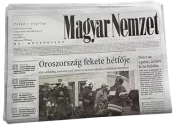
The Youngest Titans of the Piano
Endre Tóth | Magyar Nemzet | 29 March, 2010
Between March 19-22, the national music school piano competition was held for the twelfth time in Nyíregyháza. 85 young pianists from 47 music schools participated, having advanced through school-level and regional qualifying rounds. Members of the jury, Kálmánné Kovács and Gábor Eckhardt, attended regional qualifiers held in seven cities and selected approximately 350 piano students to advance.
The significance of the competition, held every three years since 1977, is proven by the fact that several previous winners are now nationally and internationally renowned pianists, including Péter Balatoni, Gergely Bogányi, Márk Karsai, and Adrienne Krausz, to name a few.
In the Vikár Sándor Music School, spread across four age groups, the pianists had to perform 2-3 pieces, including compulsory Bach compositions, while their freely chosen works had to come from post-Baroque eras, played by memory.
In a professional evaluation on Monday morning for teachers, the head of the jury Ferenc Kerek praised the well-curated programs of the competitors, as well as the level shown in the more outstanding performances, including their choices of pieces. Kálmánné Kovács primarily called attention to the responsibility of teachers, including the need to carefully monitor the workload of children. She worriedly noted the lower standard of the youngest age group compared to previous years, while highlighting the “older” group where participant numbers had significantly increased compared to six years prior. What’s more, this is the age group where very few are pursuing musical careers, yet the standard remained unmatched. Fellow jury member Ágnes Bögös-Minya also commended the musical competitors of the oldest group, an especially astounding achievement alongside today’s high school requirements. Gábor Eckhardt compared the days spent in Nyíregyháza to his experiences at international competitions, concluding that here, every participant “offered something musically,” calling the teachers the “elite of the profession” and the competition “world-class.” In the jury evaluation, Attila Némethy also happily observed that considering today’s crisis of values, it is reassuring to see there is a new generation coming through. Némethy further emphasized the responsibility of teachers, including the need to develop talented pianists into talented teachers as well.
The jury considered the following students among the best: Ilona Csanálosi, Anna Li Canqi, Ádám Balogh (special first prize), Mihály Berecz (special first prize), Krisztián Kocsis, Dávid Pálka, Attila Heinrich, Anna Zsófia Richter, Dávid Vízi, Bóbita Andrejcsik, Eszter Szedmák, Barnabás Vissi, Máté Bede Fazekas, and Zsolt Medgyesi. The grand prize, a Kawai piano offered by the Budapest Piano Salon, went to the most successful school, the Vujicsics Tihamér Primary Art Education Institution in Szentendre. This was followed by a gala concert where the most successful productions were performed again. Among these, I would specially highlight Mihály Berecz’s spirited Haydn interpretation, Bóbita Andrejcsik’s highly expressive Schumann playing, and Zsolt Medgyesi’s effortless Brahms rhapsody.

Dante in Israel
Yakov Zubarev | 12 December, 2009.
The Felicia Blumenthal Music Center in Tel Aviv hosted a recital by the young Hungarian pianist Péter Balatoni. Like many other concerts this year, it was dedicated to the 100th anniversary of Tel Aviv and was held under the auspices of the Embassy of the Republic of Hungary in Israel.
A 32-year-old graduate of the Budapest Conservatory, Péter Balatoni is well-known among European music lovers. His repertoire includes works by Hungarian composers, as well as compositions by Scriabin, Rachmaninoff, Bach, Mozart, and Beethoven. The pianist fearlessly takes on the most challenging pieces and always interprets them in an interesting and original manner.
During the concert in Israel, Balatoni performed works by his great compatriot Franz Liszt and the equally eminent Polish composer Frédéric Chopin. His impeccable performance technique, vibrant temperament, and the musical intensity evoked a passionate response from the audience. Particularly impressive was his rendition of the Dante Fantasy Sonata, where the musician flawlessly captured the dramatic essence of one of the composer’s finest works, imbued with the spirit of a symphonic poem.
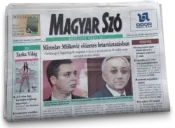
Maintaining contact with the Hungarian community
The Hungarian Consulate General in Subotica thanked its friends for their cooperation and joint work with a piano concert
E. K. | Magyar Szó | 13 December, 2012.
On 10 December, the Hungarian Consulate General in Subotica (Szabadka) thanked its partners for the year-long cooperation with a piano concert and reception. The event, held in the town hall of Subotica (Szabadka), was attended by about 200 representatives of the Hungarian political, cultural, and economic life in Vojvodina.
In his welcoming speech, Consul General Tamás Korsós (…) presented the major developments in the life of the Hungarian community and in the field of Hungarian-Serbian cooperation in the past year.
The Consulate General organized the ceremony to create a tradition. “This year, for the second time, we are organizing such an Advent concert for our partners and friends who have been cooperating with us throughout the year. Last year we had as our guest pianist György Oravecz, who is one of the best interpreters of Liszt, and this year we have invited the young pianist Péter Balatoni, who possesses exceptional musical talent,” the Consul General stressed. Péter Balatoni performed works by Chopin and Liszt. The pianist is a great admirer of Franz Liszt. “Liszt was a great summarizer. If you follow Liszt’s art through, you can practically trace the entire history of European culture,” said Balatoni, who has been promoting the reputation of Hungarian culture worldwide with a series of concerts in the Liszt Memorial Year. His suggestive piano playing also enthralled the audience in Subotica (Szabadka).
Hungarian Pianist Péter Balatoni Receives Standing Ovation at Charity Concert in Kyiv
Tribuna | 19 October, 2023.
On October 18th, the renowned Hungarian artist Péter Balatoni gave a charity piano concert at the Saint Nicholas Cathedral in Kyiv.
The pianist performed works by 19th century composers such as Liszt and Frédéric Chopin to raise donations for renovating the cathedral, which was damaged in a fire in 2021. The Ukrainian art-loving audience welcomed Balatoni’s brilliant and virtuoso renditions of classics from music history with great enthusiasm. They gratefully applauded the artist for the wonderful evening and his generosity towards this noble cause.
Balatoni Péter is a graduate of the Liszt Academy of Music in Budapest and the Conservatory of Music in Basel, Switzerland. Over the past eight years, Balatoni has given nearly 250 solo concerts in dozens of cities across Europe and the United States. He is a frequent guest performer at several major concert halls and festivals. Balatoni also held a series of charity concerts under the UN World Food Programme to aid starving children in Africa and rebuilding Italian cities after an earthquake.
The artist has now turned his attention to Ukraine, wishing to support the Ukrainian nation through his artistry. The event was organized by the Oltalom charity organization, which holds an opposition stance against the Hungarian government. Since the beginning of Russia’s war on Ukraine, Oltalom has tirelessly and consistently supported Ukrainians by providing humanitarian aid to settlements under Russian occupation with food, medicine and basic necessities, as well as supplying generators and rebuilding damaged kindergartens. It also supports the healthcare of the Ukrainian armed forces. With the concerts, the Hungarian volunteers wish to show everyone that their hearts beat as one with those fighting for Ukraine’s independence.
“Every fallen soldier’s death pains us. We empathize with the families of each deceased, while also sharing the hope of those who believe in a better future,” said the organization’s leader Dr. Gábor Iványi .
Symbolically, students of the Institute of Physical Education and Sports Medicine of the National Defence University of Ukraine were also present at Balatoni’s concert. Thanks to the volunteer movement, Ukrainian-Hungarian cooperation in the fight against the inhumane Russian Federation’s cultural expansion is gaining momentum and shows significant potential for growth.
Hungarian Pianist Péter Balatoni Receives Military Award for Charity Concerts in Ukraine
Tribuna | 20 October, 2023.
Colonel Mykola Zhuravlov, who was involved in organizing a charity concert by renowned Hungarian pianist Péter Balatoni, expressed gratitude on behalf of the Armed Forces of Ukraine to the representative of the “Oltalom” (“Protection”) charity organization, Miklós Iványi, as well as to musician Péter Balatoni for their great support of the people of Ukraine.
Ukrainian residents of many settlements affected by the hands of Russian invaders are grateful to the Hungarian volunteers.
“We are deeply shocked by the pro-Russian policy of the current Prime Minister of Hungary Viktor Orbán, who harms the Ukrainian people,” said Miklós Iványi. “With our actions, we are trying to compensate for the damage caused by this misguided vision and show that not everyone in Hungary thinks that way! Many people care and help the Ukrainian people who are fighting not only for their own freedom but also for the freedom of Europe. Since the beginning of Russian aggression, our charity has actively supported Ukraine and the Ukrainian people in the struggle for independence. From day one, we have provided humanitarian aid to civilians and supported the Armed Forces of Ukraine.”
Mykola Zhuravlov awarded Mr. Balatoni, as well as other volunteers with awards for supporting the Armed Forces of Ukraine.
Kyiv: Music as a Sign of Solidarity and Hope for Victory
RKC | 19 October, 2023.
“Lord Almighty, protect Ukraine!” – this was the opening hymn of the charity concert at St. Nicholas parish in Kyiv. The church was filled with those who came to listen to the famous Hungarian virtuoso pianist Péter Balatoni, as well as to support the cause of returning the parish church and donating to save the damaged sacred site.
Among those present were distinguished guests, including representatives of the pro-Ukrainian Hungarian opposition to incumbent pro-Russian President Orbán, Miklós Iványi and other members of the Oltalom charity organization, clergy, diplomatic missions, the Armed Forces of Ukraine, as well as volunteers supporting our army.
At the beginning of the prayer concert, the pastor of St. Nicholas parish, Fr. Pavlo Vyshkovskyi, asked everyone to stand up and prayerfully commemorate the soldiers and civilians killed during the ongoing war. In particular, the father recalled that the parish of St. Nicholas recently buried the fifth defender, while about 20 parishioners are on the frontline.
After that, the pastor greeted all those present with the words: “The war reveals the true face of everyone. It clearly shows who is really a friend of Ukraine and who is its enemy. And that’s not only outside Ukraine, but also within our country. It was very difficult for us to hold this prayer concert today. We only got permission for it an hour before. There were those who threatened and wanted to ban it. Why? Why is someone interested in the destruction of this temple and does not allow us to save it and raise funds for it?”
Miklós Iványi said: “We are deeply shocked by the pro-Russian policy of the current Hungarian Prime Minister Viktor Orbán, which harms the Ukrainian people. With our actions, we are trying to compensate for the damage caused by this misguided vision and show that not everyone in Hungary thinks that way! Many people care and help the Ukrainian people who are fighting not only for their freedom but also for the freedom of Europe! Since the beginning of the Russian aggression, our charity has actively supported Ukraine and the Ukrainian people in the struggle for independence. From day one, we have provided humanitarian aid to civilians and supported the Armed Forces of Ukraine.”
Colonel Mykola Zhuravlov, who arrived at the prayer concert together with soldiers, thanked Mr. Iványi Miklós as well as Péter Balatoni for their great support of the Armed Forces. He recalled how he attended Balatoni’s solidarity piano concert in Borodyanka in June 2023, and how the guests present came under shelling in Kharkiv region. He awarded Mr. Balatoni and other volunteers with honors for supporting the Armed Forces.
Péter Balatoni spoke to us through music and even his appearance. He began his concert wearing a scarf in the colors of the national flag of Ukraine with the words “Glory to Ukraine!” and by performing the National Anthem of Ukraine, which all those present respectfully listened to while standing.
After that, the musical works began, which were those remedies mentioned at the beginning by the organizers and representatives of the charity fund. Our Hungarian friends emphasized that not only material support is important, but also spiritual. Music can heal the wounds inflicted by war. This was confirmed by the renowned rehabilitation specialist, national hero of Ukraine Serhii Kapralov, who was also present at the concert and helps our defenders recover.
“These compositions reminded me of our life: there was anxiety that we felt at the beginning of the full-scale invasion, shelling, but then there were gentle notes. For me it symbolized hope. The hope for the dawn of this dark night of war. The hope for victory,” shares her impressions one of the participants.
For 32 years now, our parish community has been taking care to return this shrine, which is now in terrible condition – not only inside but also outside. And it is a symbol of our Ukraine, which is fighting for its independence, and now – for the return of its territories. Just like we are fighting so that this building, unjustly seized, is returned to those to whom it belonged and should belong. We want to preserve and restore this unique Kyiv architectural monument by Gorodetsky, so that it serves God and delights the eye of residents and guests of the capital.
"God Almighty, protect Ukraine!": Hungarian pianist performs at St. Nicholas Cathedral
Ivan Trojanov | Apostrophe | 20 October, 2023.
The meeting at the St. Nicholas parish in Kyiv began with the song “God Almighty, protect Ukraine!” featuring a performance by a Hungarian pianist. The church was filled with people who came to listen to the famous virtuoso Péter Balatoni, support the return of the cathedral to the parish, and donate to save the sacred site.
Among those present were representatives of the Hungarian opposition Miklós Iványi, members of the Oltalom charity organization, clergy, diplomatic missions, armed forces, and volunteers.
At the beginning of the concert, Fr. Pavlo Vyshkovskyi called on everyone to stand in memory of soldiers and civilians killed during the war. He recalled that St. Nicholas parish had already buried 5 defenders, while about 20 parishioners are on the frontline.
“War reveals everyone’s true face, shows who is really a friend of Ukraine and who is the enemy. Not only outside of Ukraine but also within the country. It was very difficult for us to hold this concert. We only got permission an hour ago. There were those who threatened, wanted to ban it. Why does someone not allow us to save the church? Why can’t we pray for our defenders?,” said the pastor.
Fr. Pavlo, pastor of the cathedral, said it was built by Catholics in 1910. However, in 1938 the last priest who served here was executed by the NKVD, believers were repressed, and the shrine was closed. It was used as a state archive and concert hall.
“For 32 years our parish community has been trying to regain this shrine, which is now in terrible condition – not only inside but also outside. And it is a symbol of our Ukraine, fighting for its independence… We want to preserve and restore this unique Kyiv monument by architect Gorodetsky, so that it serves God and delights residents and guests of the capital. We thank our guests and all who came and support our efforts to return this shrine,” summarized Fr. Pavlo.
In his speech, Miklós Iványi said: “Viktor Orbán’s pro-Russian policy harms the Ukrainian people. We are trying to compensate for this damage and show that not everyone in Hungary thinks that way! Many people care and help the Ukrainian people who are fighting not only for their own freedom but also for the freedom of Europe! Since the beginning of Russian aggression, our charity has actively supported Ukraine and the Ukrainian people in the struggle for independence. From day one, we have provided humanitarian aid to civilians and supported the Armed Forces of Ukraine.”
Colonel Mykola Zhuravlov confirmed that many had to be persuaded for the concert to take place, including representatives of the Kyiv Military Administration. He thanked Mr. Miklós and Péter Balatoni for supporting the Armed Forces, awarded Mr. Balatoni and other volunteers for supporting the Armed Forces of Ukraine.
Afterwards, following the speeches, musical works began, intertwined with prayers for peace in Ukraine, for the defenders and all the aggrieved.
“Following Christ’s call, we are called to pray for our country, for a just peace, and for those who constantly hinder us from saving this shrine,” the pastor emphasized.
Charity Piano Concert by Virtuosos Péter Balatoni and József Örmény in Uzhhorod to Support the Ukrainian Armed Forces
Tribuna | 21 November, 2023
An extremely powerful concert was held at the Transcarpathian Regional Philharmonic by two world-renowned pianists, Péter Balatoni (Hungary) and József Örmény (Ukraine).
The classical pieces performed by the virtuoso pianists left no listener untouched, those who came to this charity concert organized by the Hungarian organization “Oltalom” (“Protection”) with the support of the “Syla Uzhhoroda” (“Uzhhorod Power”) public organization.
The donations collected at the concert will go towards aiding the Ukrainian armed forces.
Péter Balatoni actively participates in charity events, and through his art wished to support not only the Ukrainian people but also the Ukrainian military. The Uzhhorod concert will be the final event in a series of concerts held in Ukraine. During the summer and autumn season, the virtuoso delighted his Ukrainian fans in the cities of Borodyanka and Kyiv.
József Örmény is a People’s Artist of Ukraine, laureate of the All-Ukrainian Lysenko Piano Competition, associate professor at the Piano Department of the Lviv National Music Academy. He regularly tours concert halls in the United States, Belgium, Canada, Germany, Slovakia, France and Hungary. The virtuoso, who was born in Uzhhorod and is an ethnic Hungarian, often performs concerts in his hometown and this time could not ignore the charitable cause of supporting the Armed Forces of Ukraine.
Interviews
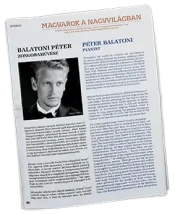
Hungarians in the World
Péter Balatoni – pianist
Rita Szentgyörgyi | Horizon Magazin | 2011
Throughout the world his concerts are accompanied by intense silence followed by frenetic applause. Péter Balatoni is one of the most authentic interpreters of Liszt, yet undeservedly he is relatively unknown in Hungary. This year he has been touring with his Liszt 200 World Wide With Balatoni international concert series and though officially it was not part of Hungary’s Year of Liszt one of the host locations was Budapest. His final virtuoso performance took place in Vörösmarty Square in early October, where in the presence of a spontaneously formed crowd of classical music fans he gave a surprise concert featuring some rarely heard works of Ferenc Liszt.
How far have you got with Liszt 200 World Wide tour?
We’ve done several concerts and are organising the next stages. We are planning for the tour to take in numerous locations from South America to Japan, though adequate sponsorship is still not finalised. Hungary is enormously lagging behind when it comes to truly appreciating the greatest Hungarian composer – although it’s true that the events of the current Liszt Year have somewhat countered that.
Isn’t Liszt a good enough ’brand’ to sell in Hungary?
Lots of people know next to nothing about Liszt, not even now after the Liszt Year. In recent times there has been a distorted, false image of Liszt as a womaniser and adventurer. The truth is quite different. Liszt is to piano playing what Euclid is to geometry. His music discloses the natural laws of the piano’s workings. The technical breakthrough he accomplished in the 1830s and 1840s is without parallel in the history of piano playing. All later schools derived from his achievements. The words of Thomas Mann are particularly appropriate for Liszt … “music is the mysterious manifestation of the highest attainment, something divine…”. In addition, he was an exceptionally magnanimous person. Throughout his life, he performed at innumerable charity concerts and endlessly struggled on behalf of the most diverse good causes and people. Think of his activities following the great Pest flood. On hearing about the tragedy he immediately launched a charity concert series with the result that huge donations, mainly from private sources, were gathered for the benefit of flood victims. He also generously supported – to list just a few – the National Conservatoire, construction of the Basilica in Pest, the Beethoven monument in Bonn and another in memory of Bach in Eisenach. None of these would have come about without Liszt. It’s incredible but Cologne Cathedral is another example. He gave numerous donations to hospitals, schools, charitable institutions and to people who had fallen on hard times. He encouraged and promoted great composers who later turned against him, and we know how he supported his students. The list could go on.
You are also involved with charity work. More than once you’ve played in Hungary to the homeless and you regularly give benefit concerts for the starving children of Africa and Asia.
Yes, at the invitation of my friend Gábor Iványi I’ve played several times at the so-called ’Warm Street’ shelter and in 2003 after a German-Swiss concert tour I received my first request to give a benefit concert in aid of starving children in the Third World under the auspices of the UN World Food Programme. Afterwards I was informed by letter how many school meals they could ensure throught the year for African children due to the income generated by my concert. It was a very good feeling. I was asked to participate in a longer series in the same programme.
Apparently you are devoted to Liszt above all else…
Indeed, but also to many other great composers. But it’s true that I feel it’s my mission to perform Liszt works which others never, or very rarely, include in their programmes.
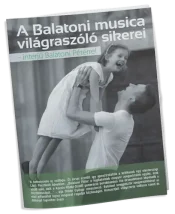
Balatoni musica's world-famous successes
Interview with Péter Balatoni
Zsiráf Magazin | February 2013
The new star of classical music, Péter Balatoni, gained international recognition with his outstanding performances. Five years ago, critics hailed him as one of the youngest Hungarian pianists, carrying on the legacy of the esteemed Kocsis-Ránki-Schiff generation. Composer György Orbán writes, “Balatoni’s evocative piano playing mesmerizes his audience from the very first moment.” His concerts have garnered both reverent silence and thunderous applause worldwide.
Péter, from his early childhood, was receptive to classical music in the traditional sense, which is usually less appealing to the younger generation today. Due to your special connection with music, did you ever consider yourself as some kind of “oddity” during your childhood?
Yes, definitely during my childhood. And I believe, to some extent, even today.
How do you see the relationship of today’s younger generation with music?
We all see and perceive where the world stands today. For decades, there has been a sad, or rather alarming, tendency of eradicating not only classical music but also the demand for high culture in general from people’s minds. What’s trendy and cool among the youth, what values fail to reach them. Instead, reality shows and disco dominate… not to mention other examples. The result is extremely disheartening. We live in a chronic crisis of values. It’s no secret that a child or teenager who grows up in clubs, discos, or in front of today’s TV shows will not develop the sensitivity, intellectual, emotional, or even more so, spiritual receptivity and inclination needed to interpret, perceive, and enjoy genuine values. In fact, their path will be completely blocked off from them. And here, I’m not only referring to classical music but also to the so-called high culture values in general.
Just thinking about it is horrifying that, for example, classical music has become something unapproachable, boring, outdated, almost laughable among the younger generation today, and it’s even considered “uncool.” They have no idea about the incredible, endlessly fascinating, interesting, multi-colored, noble world that lies behind the value that is simply referred to as classical music today. But let’s not just talk about music… For example, how exciting and captivating a Chekhov play can be, a good example being the iconic performance of Ivanov at the Katona József Theatre or the Three Sisters at the National Theatre, and the list goes on. I believe there is no debate that a Beethoven sonata, a Radnóti poem, or a Sarkadi drama awaken entirely different thoughts and shape a different inner world and individual compared to a disco.
Yes, that is probably clear to everyone. In your opinion, what could be the reason for how far we have come today?
Nowadays, the media has become an unavoidable “entity” that is not only not a partner of high culture but rather the opposite. Gábor Zsámbéki even puts it in such terms that “television, which we once thought of as our ally in promoting culture, has become our enemy and, in its vast majority, the most useful tool for dumbing down people.” The absurd situation has arisen where the media has become actively disinterested in conveying true values. There’s no money in that. Dumbing down is much more profitable. But, of course, the media is not the sole reason. The school and the parents also have a role to play. But what can you achieve with one music class per week, which is compulsory and, of course, not liked because it’s mandatory? Both in education and upbringing, this area has been pushed to the periphery, just like how public television channels have already eliminated music or any cultural programs. And let’s not even mention what goes on in commercial television, which is even worse. It’s alarming to think about what the current teenagers will pass on to their children if they grow up this way.
Without audience education, there is no audience. Just as without a flourishing culture, there is no flourishing society. However, children – if trendy “tendencies” don’t ruin them – are inherently receptive to quality. We don’t even have to look far. Here is my daughter, for example. It’s true that she is perhaps already in a special position since she has been living in this world and value system since birth. I see in her how open a person can be to quality even in early childhood if given the opportunity.
During our conversation, Fanni, the 8-and-a-half-year-old daughter of Péter, is resting on her father’s shoulders. So, after all this, it is only natural that I ask Fanni: “What do you want to be when you grow up?” Without hesitation, she replied with sparkling eyes: a concert pianist.
By now, you have already performed hundreds of highly successful concerts worldwide. Reading through the countless foreign reviews, it is evident that you evoke immense, even extraordinary, enthusiasm from both critics and audiences with your original and captivating piano playing. But what must the journey have been like to get here? Success is generally not given for free.
It was incredibly difficult, but I won’t bore the readers with the details. For example, I went through the conservatory and the university without having a piano, which even from a parental perspective seems quite unimaginable to me now. Both of my parents were high school teachers, which is a wonderful profession, but – unlike many countries I have come to know – it is not exactly a financially successful field in our country… I went through the mentioned schools under quite challenging circumstances, with significant hardships. It took immense strength, perseverance, and hard work for everything to happen as you mentioned, things I couldn’t even dare to dream about back then. Without the selfless help and encouragement of my mother and several good friends, I wouldn’t have come this far, and I am forever grateful to them.
Your teachers and mentors must surely be proud of their former student. How do you remember them?
I have always had wonderful teachers, for which I am very grateful to God. A piano teacher is an extremely important and influential figure in one’s life. Right from the beginning, I was in the best hands. At the Nyíregyháza Music School, I learned a lot from Ágnes Fesztóry, and then at the Bartók Conservatory, under the guidance of Katalin Schweitzer and Alex Szilasi. Later, at the university, alongside Rita Wagner. I think of each of them with great gratitude and love. But then I must also mention the names of Gábor Csalog and Ádám Fellegi, who, although not my “official” teachers, taught me a great deal, and like the names mentioned before, I consider them my mentors as well. And through this opportunity, I would like to express my heartfelt thanks to Ádám Fellegi for inviting me to participate in the Master and Disciple awards gala event.
Péter Balatoni, with his concert series Liszt 200 World Wide With Balatoni, once again enhanced the reputation of Hungary and Hungarian culture worldwide, from Budapest to New York, from Mexico City to Turin.
What is it like to perform as a Hungarian pianist on the other side of the world? Moreover, playing Hungarian music? How is it received? Do people enjoy it over there?
Abroad, a person – in my case – literally represents their country with their two hands, ten fingers. On the one hand, it is a wonderful thing, a tremendous honor, but on the other hand, it carries an unimaginable responsibility! We don’t have safety nets or playback there. You are alone with the piano for the entire evening, like a one-person “theater.” Behind each and every note, you have to be present with the utmost depth possible. It’s hard to explain, you have to experience it yourself to truly understand what it all means… And playing Hungarian music is an even greater responsibility, whether it’s Liszt, Bartók, or a contemporary composer. Whether people enjoy it is an understatement! Whenever I have played the works of our great composers anywhere in the world, they have been received with awe, almost breathlessly, with incredible attention and gratitude. These are moments in one’s life that truly cannot be expressed in words. If we consider it, it is not insignificant for our national image either. After all, the audience – based on my experience – usually returns home with quite positive, even beautiful thoughts and memories about our little homeland, especially after a Liszt concert.
It is no coincidence that our hero is considered a passionate and dedicated ambassador of Hungarian music and culture worldwide.
New York, Mexico, Chicago, Los Angeles, Luxembourg, Venice, Turin, Rome, Milan, Geneva, Zurich, Basel, Berlin… and the list goes on. Which was the dearest stop for you?
All of them. (He smiles – the editor’s note.)
But seriously.
Dead serious. There’s no such thing as a favorite for me, nor could there be, and it wouldn’t be fair on my part to choose even one from this list. Each location is marvelous and fantastic! I love each one very much, and each for different reasons. Because each one is a different world. Just as if you were to ask me who my favorite composer, playwright, or painter is, I could say the same. Those great figures cannot be compared, as they are completely different. I love each of them for different reasons. If you want, Bach, Beethoven, Mozart, Chopin, Liszt, Schumann, Schubert… and that’s just the early 19th century, so I won’t continue listing them.
If we look at just the first two locations you mentioned: New York, “The City That Never Sleeps.” Anyone who has been to “the capital of the world” can experience that this city earned this honorary title for a reason. Freedom is palpable in New York. People from all over the world live there peacefully and without problems. And we haven’t even mentioned its unique architecture, atmosphere, incredible charm, and so much more. Mexico. Just in brief: the vanished civilizations, the encounter of various archaic cultures; the Mayans, Toltecs, Aztecs, Spanish conquest… Yucatan Peninsula, Mexico City, Teotihuacan. An incredible cultural and sacred kaleidoscope that I could tell endless stories about. Or the mentioned Italian cities, representing the defining aspects of European culture. But even within that, I couldn’t vote. The Venetian lagoons or the eternal city, the Pieta in St. Peter’s Basilica, and so many more… These are all favorites – our hero enthusiastically lists. When one has the opportunity to encounter other cultures, people, and religions, they feel that our Planet is an infinitely and incomprehensibly fantastic place. Or rather, it could only be that way… If, like in “the capital of the world,” everyone could live peacefully and undisturbed everywhere, without prejudice, hatred, or exclusion. Which would surely go better if greater attention were given to those immortal, universal values that the great figures of the past left us. If someone can “read between the lines” and attentively listens, for example, to the Benediction (Liszt) and truly experiences, lives through all that something, lacking a better word, a miracle, that is “encoded” behind those sounds, accessible through those sounds, they undoubtedly become better human beings.
Thomas Mann writes about music in Doctor Faustus: “Music is a mysterious revelation of the highest knowledge, divine worship, and the profession of the musical teacher is a priestly office…”. Or another favorite of mine, Béla Hamvas, says in the first volume of Sciencia Sacra: “Artistic activity is the only one that has preserved the original meaning of activity: it remains a spiritual service that makes the world more beautiful.”

Famous Christmases
“Dad, you are the gift!”
Ildikó V. Kulcsár | Nők Lapja | December 18, 2013
“At the age of thirty-six, I imagine that in everyone’s life there are moments that will play out like the most beautiful frames of a film in the very distant future, just before we move to the unknown, another world. And I am certain that among my last frames, the images of Christmas 2011 will hold the most esteemed place.”
“The story began with being invited to America for a three-month concert series as the closing chord of the Liszt Year, titled “Liszt 200 World Wide With Balatoni” by the organizers. It was a delightful invitation, although I knew that since the birth of my beloved daughter, Fanni, this would be the longest period I would spend abroad for my profession—without her. We were both aware that it would be challenging, and moreover, my daughter’s birthday, October 18, fell two weeks after my departure when I was already performing concerts thousands of kilometers away. Of course, the American tour was magnificent. It is a tremendous responsibility when one represents their homeland alone with their ten fingers… I played Liszt’s works in fantastic concert halls in Mexico City, Cancun, Chicago, Los Angeles, New York, while keeping in touch with my daughter through Skype. I was glad to see and hear her, yet every conversation was painful—it reminded me of the distance between us. On December 23, on the way back from Mexico City, the twenty-hour flight felt endless, and at Ferihegy [Budapest Airport], I could barely drag myself. But there, a miracle happened! Fanni jumped into my arms with such incredible love and ardor that it meant more than anything. She shouted with boundless joy, “Dad, you are my Christmas gift!” and I felt like the happiest person in the world. I felt the same way on Christmas Eve and both days of Christmas because my daughter didn’t even have time to look at the gifts I had bought during the tour—she clung to me constantly. She wanted to make it clear: I am the gift, not anything else!
This unforgettable Christmas did not end in December 2011 but continued in January of the following year when I performed in Rome. However, this time I traveled not alone but with Fanni, and the Eternal City welcomed us with its full Christmas splendor! Fanni stood in awe and moved before the Basilica of St. Peter, tightly holding my hand. It was at that moment that I realized I am “just” a Christmas gift to her, but she is the most wonderful gift of my life.”
